

Www.moralpremise.com/StoryDiamondAnnotations.pdf. Www.moralpremise.com/StoryDiamondBlank.pdf. Www.moralpremise.com/StoryDiamondKey.pdf. The Moral Premise Blog: Story Structure Craft. The Moral Premise: Harnessing Virtue and Vice for Box Office Success. Home Page. Theme and Premise. Holly Bayling-Fields asks: My writers' group is working on the basic fiction writing topics like plot, setting, theme, and premise.

I'm still confused about theme and premise. Can you explain them and outline the differences for me? Response: Relax, Holly! Many writers have the same problem you do when it comes to understandingtheme and premise. Writers have an insider "craft" language and use terms in very specific ways that can differ from the ways laypeople use them. -------------------------------------Theme ------------------------------------- I know you're American, so let' take an example from your life: You celebrate Thanksgiving each year.
How to Develop Your Premise into a Compelling Script. By Kathryn McCullough In my fifteen years of working as a story analyst for film companies, I have found that most of the scripts I read fall short of success because the author has failed to develop the story beyond the initial set-up.
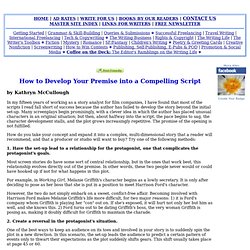
Many screenplays begin promisingly, with a clever idea in which the author has placed unusual characters in an original situation; but then, about halfway into the script, the pace begins to sag, the character development stalls, and the plot grows increasingly repetitive. Moral Premise Sample. The Art Of Dramatic Writing. The Art Of Dramatic Writing by Lajos Egri.
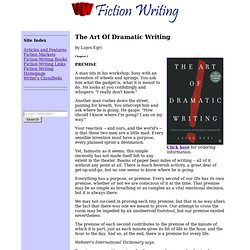
The Dramatic Premise. The Dramatic Premise I'm getting to the part of the class where I’ll be discussing many of the strategic undercurrents that swirl about a story.
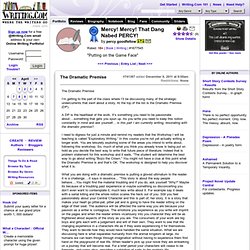
At the top of the list is the Dramatic Premise (DP). A DP is the heartbeat of the work. Dramatic Premise steps. Writing Good Log Lines. This is the last article you’ll ever need to read on log lines. Our goal: a strong, pithy pitch for a movie that will keep you focused as a writer and get your audience into the theater. Because I teach, consult, write, and direct, I am always in desperate need of a good log line.
If not for the story I’m currently working on, then to explain to my wife what I did all day long at home while she was off earning money to pay for our groceries. I’m always having to come up with them, or help others figure them out – the log lines, not the groceries. So, I needed an easy to remember formula that worked. How to write Film Logline Concept Premise How to test your movie idea. Before you write a single scene of your 120-page screenplay, try to express your film’s logline in 27 words or less. Putting your concept to this simple, early test can help focus your narrative, gauge potential and save years of wasted effort.
Write your logline at the beginning – not the end Typically, screenwriters sweat for months or years over a screenplay, going through endless drafts, major revisions and minor refinements. Writing Your Book's Premise and Synopsis. A reader from Minnesota has gotten interest from a publisher, but the publisher has asked for a written statement of her book--often called a premise statement--and a longer synopsis with market analysis.
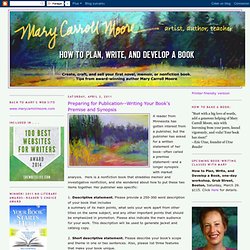
Hers is a nonfiction book that straddles memoir and investigative nonfiction, and she wondered about how to put these two items together. Her publisher was specific: The Good Seed. Will you ever run out of story ideas?

What a laughable question. Of course not! There are more stories in your cocktail napkin collection than you’ll be able to use. And new story ideas–? Novel Matters: The Power of Premise - A She Reads Guest post by Ariel Allison Lawhon. Our second Audience with an Agent contest is underway.
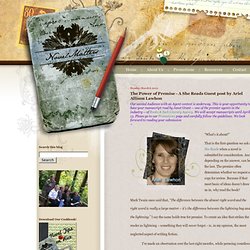
This is your opportunity to have your manuscript read by Janet Grant -- one of the premier agents in the industry -- of Books & Such Literary Agency. We will accept manuscripts until April 15. Please go to our Promotions page and carefully follow the guidelines. We look forward to reading your submission. The Other Side of the Story: Look! It's An Idea: Going From Premise to Plot. By Janice Hardy, @Janice_Hardy I didn't know it at the time, but the first real novel I ever wrote was a premise novel.

I had a cool idea, and the entire book was about illustrating that cool idea. Because of that, I had no solid protagonist, no narrative drive, no personal stakes, and no chance at selling that book. Strange Horizons Fiction Department: Stories We've Seen Too Often. (List last updated 10 March 2012) For information about what we're looking for and how to submit, see our main fiction guidelines page.
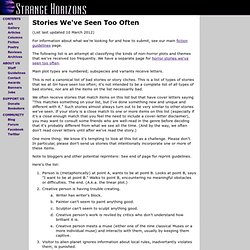
Alexandra Sokoloff: What's your premise? I have been trying to figure out what topic to cover next, as we analyze these pages and pages of brainstormed ideas.

And I think I'd like to skip ahead for a second, not much ahead, and cover the topic of PREMISE (again), because what we really need to start looking for in all the brainstorming you did is actual STORY LINES. And it's possible that the best way to recognize stories in your own ideas (that is, STORIES, as opposed to IDEAS) - is to do some practice on PREMISE. One of the most frustrating (and sometimes amusing, in a morbid kind of way) things for me as an author and teacher is how difficult it can be sometimes to get a writer's story out of them. It should be simple, right - to answer the question: “What’s your book about?” Plotting and The Premise. Plotting is what creates the action in your novel.
The technique varies. Some people are what writers call Pantsters or SOTP (writing from the seat of their pants) while some writers create an outline or synopsis. Often the outline or synopsis is sketchy, leaving openings to take interesting detours on the character’s journey. This allows creativity without being tied to a pre-proposed plot. Designing Your Novel's Premise. Where do you get your ideas? If I had a nickel for every time I’ve been asked this wrong-headed question. . . . Ah, well. When a non-writer asks me this question, basically, I just smile and lie, because the truth is more complicated, less magical, indeed, a good deal grubbier than most people who are just making conversation really care to hear. If you tell them that it’s work — hard work — they look at you like they suspect that you must be doing it wrong. How a Strong Story Premise Sets You up for Success. A story premise focuses your writing.
To excite the interest of an agent, it is imperative that the agent knows immediately what your novel is "about. " The value of this cannot be underestimated. Loglines & Premises - WHERE'S THE DRAMA? Essentially, a screen story's log-line should tell the reader who must do what in order to prevent what from happening. How to Write a Story: The Premise « How to Write a Story. August 20, 2007 by writeastory. The most cliche story premises. Six Tests of a Solid Story Premise and Eight Ways to Write One.
Foundation of Storytelling, An Essay by Bill Johnson. Premise -- Foundation of StorytellingBy Bill Johnson. Patrick Farley's List of Story Premises 2009. Creating The Premise For Your Novel.